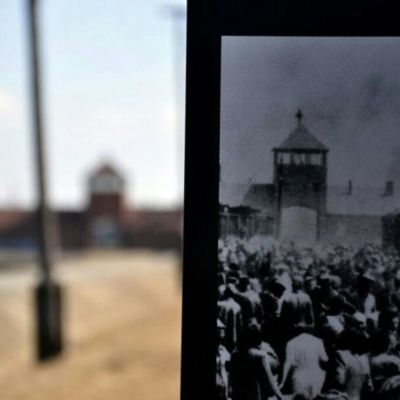The official podcast of the Auschwitz Memorial. The history of Auschwitz is exceptionally complex. It combined two functions: a concentration camp and an extermination center. Nazi Germany persecuted various groups of people there, and the camp complex continually expanded and transformed itself. In the podcast "On Auschwitz," we discuss the details of the history of the camp as well as our contemporary memory of this important and special place. We kindly ask you to support our mission and share our podcast in social media. Online lessons: http://lesson.auschwitz.org
http://www.auschwitz.org
Gesamtlänge aller Episoden: 1 day 56 minutes
episode 30: "On Auschwitz" (30): Why the Auschwitz camp was not bombed?
The Auschwitz II-Birkenau gas chambers and crematoria never became targets for Allied bombing, despite reports about their existence forwarded both by the Polish resistance movement and some people who escaped from the camp. Instead, American bombers carried out several strikes against the IG Farben petrochemical installations located at the distance of seven kilometers from Auschwitz.
Dr...
episode 31: "On Auschwitz" (31): Christian clergy at Auschwitz
The Germans incarcerated at least 464 priests, seminarians & monks as well as 35 nuns in #Auschwitz. Teresa Wontor Cichy, from the Museum’s Research Center talks about the fate of Christian clergy and about religious life in the camp.
See also our online course: http://lekcja.auschwitz.org/en_18_duchowienstwo/
episode 32: "On Auschwitz" (32): Documents analysis: how Auschwitz camp attempted to transfer 30 women prisoners from Ravensbrück
The analysis of the surviving documents of the camp administration makes it possible, on the one hand, to trace how the centralised concentration camp system administered by the SS in Nazi Germany functioned, while, on the other hand, it also shows various aspects of the functioning of the camp itself and the members of its garrison...
episode 33: "On Auschwitz" (33): Creation of the Auschwitz Memorial
After the liberation of Auschwitz, its two main parts - the former main camp (Auschwitz I) and Auschwitz II-Birkenau - were first placed under the control of the Soviet military authorities. In the first of these, from February to September 1945, Soviet field hospitals and the Polish Red Cross hospital operated, where most of the surviving prisoners were treated. A transit camp for German prisoners of war also operated there from spring to autumn of that year...
episode 34: "On Auschwitz" (34): The first moments at the Auschwitz camp
You have arrived not at a sanatorium but at a German concentration camp in which the only way out is through the chimney. If someone doesn’t like this, he may at once go to the wires. If there are any Jews in this transport, they have no right to live longer than two weeks. If there are any priests, they may live for a month, the rest only three months.
This is how the speech given by Auschwitz camp manager Karl Fritzch was recalled by Jan Karcz in his memoirs...
episode 34: "On Auschwitz" (35): Plunder of the property of Auschwitz victims
One of the elements of the operation of the Auschwitz camp was looting of the property of people deported to the camp. This was most intensified when Nazi Germany began the extermination of Jews at Auschwitz.
Most of the property - after being sorted and disinfected - was sent to the Third Reich, where it was handed over to various groups of the German population, organizations and institutions.
Dr...
episode 35: "On Auschwitz" (36): The story of Sophie Stippel, the cook of Auschwitz commandant Rudolf Höss
One of the prisoners in the first transport of women to Auschwitz - 999 women transferred from Ravensbrück concentration camp in March 1942 - was Sophie Stippel. She was registered as prisoner number 619.
She was arrested because she belonged to the group of Jehovah's Witnesses.
A few days after arrival, Sophie was employed as a domestic helper in the villa of the camp commandant, Rudolf Höss, which probably saved her life...
episode 37: "On Auschwitz" (37): Different cases of organized resistance at Auschwitz
In the history of Auschwitz, there were instances when prisoners tried to resist. The most famous event is the Sonderkommando revolt that took place at Auschwitz II-Birkenau on 7 October 1944. This story is told in episode 21 of our podcast.
However, there were other cases of prisoners organising resistance in order to attack SS members, or to escape...
episode 38: "On Auschwitz" (38): Women supervisors at Auschwitz
Over two hundred women served the SS in KL Auschwitz. They were divided into three groups according to the duties they performed: the biggest group constituted the so-called Aufseherinnen, whose main task was to watch over women prisoners; the second group was formed by women employed in communication services described as SS-Helferinnen working in SS headquarters offices as radiotelegraph operators, stenographers and telephone operators; the last group consisted of nurses.
Dr...
episode 39: "On Auschwitz" (39): Keeping the functioning of Auschwitz in secrecy
Although the SS took various measures to keep the functioning of the camp secret, especially when Auschwitz became both a concentration camp and extermination center, news about the camp got out.
Dr. Piotr Setkiewicz, the head of the Museum Research Centre, talks about how information about Auschwitz could reach the world.
